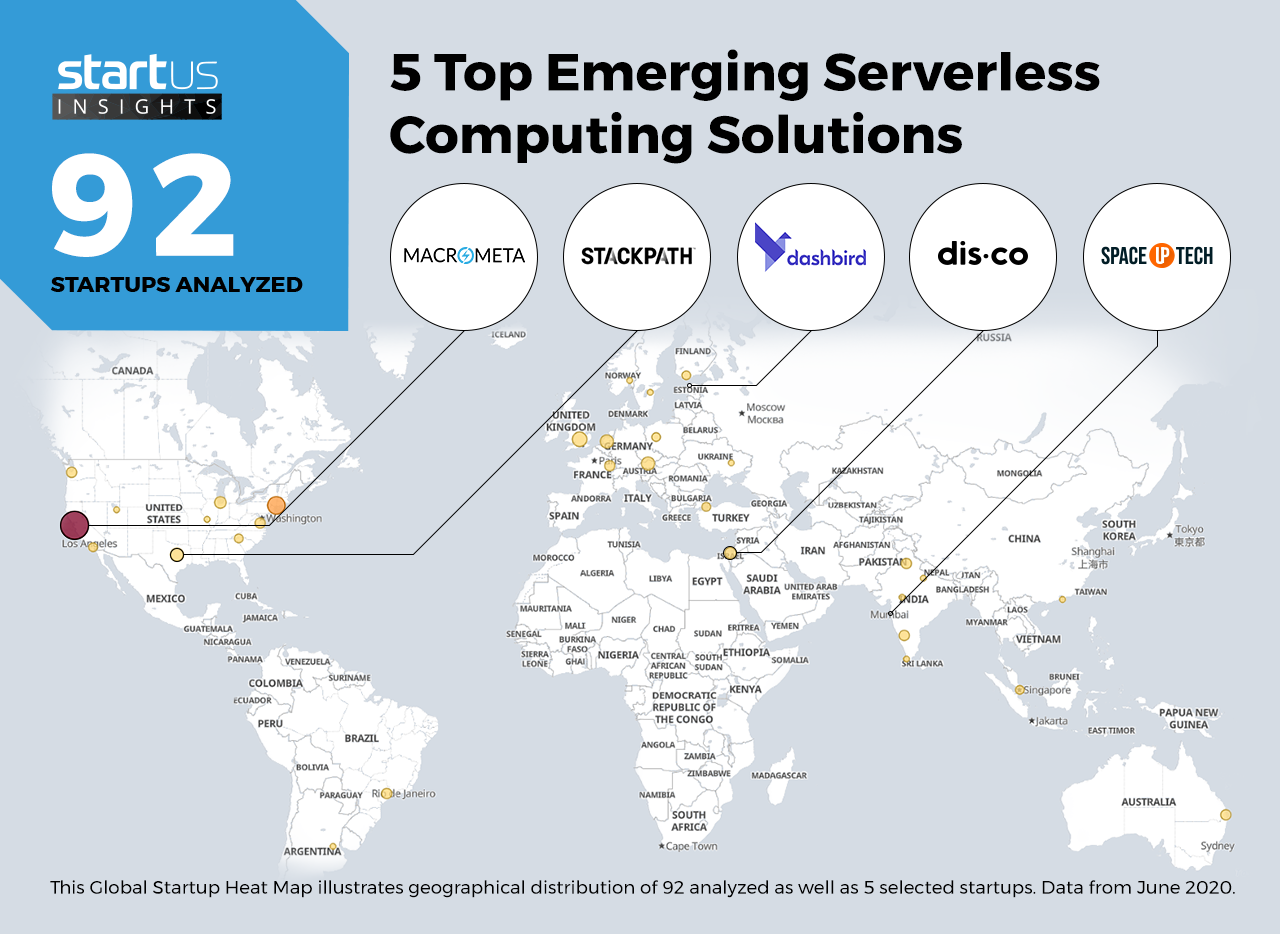Accelerate Productivity in 2025
Reignite Growth Despite the Global Slowdown
Our Innovation Analysts recently looked into emerging technologies and up-and-coming startups working on solutions for industry 4.0. As there is a large number of startups working on a wide variety of solutions, we want to share our insights with you. This time, we are taking a look at 5 promising serverless computing solutions.
Heat Map: 5 Top Serverless Computing Solutions
Using our StartUs Insights Platform, covering 1.116.000+ startups & emerging companies, we looked at innovation in the field of industry 4.0. For this research, we identified 92 relevant solutions and picked 5 to showcase below. These companies were chosen based on a data-driven startup scouting approach, taking into account factors such as location, founding year, and technology among others. Depending on your specific criteria, the top picks might look entirely different.
The Global Startup Heat Map below highlights 5 startups & emerging companies developing serverless computing solutions. Moreover, the Heat Map reveals regions that observe a high startup activity and illustrates the geographic distribution of all 92 companies we analyzed for this specific topic.
Space Up Technologies – Serverless API Gateway
A serverless Application Programming Interface (API) requires high-quality architecture and maintenance to enable security and transparency. This nudges systems to get off the ground and increases the stability of a system. A cloud API gateway is a centralized endpoint for serverless backend services that support more flexible queries from data consumers. Moreover, it enables developers to execute, secure, analyze, and manage APIs on a large or global scale.
Indian startup Space Up Technologies develops an open-source Kubernetes-based platform, Space Cloud, that helps build, scale, and secure cloud-native applications, at scale. The platform offers instant GraphQL and REST APIs and microservices for databases, to be consumed securely and directly from any front-end point. Using serverless API gateways reduce time to market and manage CRUD operations in real-time. Additionally, these gateways provide file storage APIs for various data stores with authorization and access controls.
Macrometa – Stream & Batch Processing
Serverless stream and batch processing receives a constant flow of data packages and analyzes it in real-time. Cloud analytics helps process data, detect patterns, apply conditions, and react accordingly. A flexible serverless system overcomes high-load peaks, and within the pay-per-use billing model, it structures and combines data to trigger a custom data processor. Nowadays, startups are working to make this technology affordable for use across industries.
The US-based startup Macrometa provides a real-time event processor, Global Data Network (GDN), that accelerates stream processing by allowing to ingest, transform, and forward data to warehouses, databases, or applications. The distributed data service creates dynamic event processing pipelines with built-in connectors, processors, simple API-based real-time messaging, and queuing. The GDN also provides a distributed cache that implements on a cloud database or data warehouse. Further, GDN caches new data from the cloud with services like Firebase, DynamoDB, and MongoDB Atlas.
Dis.co – Cloud Automation & Cron
Securing data, and to keep it running continuously, requires important server tasks like backing up databases, changing configurations, and periodically updating cron tasks, a software utility. Serverless services automate cloud processes as they do not require a server to run constantly. Cloud schedulers automate big data jobs, cloud infrastructure operations, and help developers reduce the time spent on administrative tasks to focus on core business tasks.
Israeli startup Dis.co develops parallel computing technology using a smart scheduler to route jobs to compute nodes. This smart scheduler feature eliminates the need for building home-grown scheduling and orchestration tools. As a result, the scheduler automates the parallelization of large-compute workloads. Since deployment and management processes are interconnected, the startup optimizes any job in terms of time and cost.
Stackpath – Serverless Functions
Function-as-a-Service (FaaS) handles the configuring, provisioning, load balancing, sharding, scaling, and managing the infrastructure of applications. This allows information technology (IT) companies to focus on tasks that bring value to building these applications. Using an event-driven model, serverless functions automatically execute code to accelerate development and seamlessly integrate third party services. The efficient use of resources cuts costs as it employs a pay-as-you-use pricing model.
The US-based startup Stackpath offers serverless scripting technology to run computing scripts that execute behaviors at the edge. This cloud platform connects full-stack edge locations using a private backbone to enable developers to take control over without hard coding. The platform additionally enables workloads with near-endless scalability for rapidly changing traffic volumes. Moreover, Stackpath serverless scripting sandbox allows test computing in the cloud, before deployment into production, as the cloud engine ramps up to the necessary level.
Dashbird – Identity & Access Management (IAM)
Most web applications need to control access and visibility for serverless applications from a single interface. There are external services that help administrators to manage, authenticate, and authorize users. The serverless user management system helps speed up application development and implementation of higher security standards.
Estonian startup Dashbird develops a serverless monitoring platform that enables the automatic detection of cloud resources and alert coverage for known and unknown failure points. The startup’s serverless IAM engine monitors the architecture supporting DynamoDB, SQS, API Gateway, and ECS, and cross-checks them against complex rules. This platform manages cloud systems, provides metrics and alerts, distributes tracing, and logs aggregation in addition to deriving insights into possible failures.
What About The Other 87 Solutions?
While we believe data is key to creating insights it can be easy to be overwhelmed by it. Our ambition is to create a comprehensive overview and provide actionable innovation intelligence so you can achieve your goals faster. The 5 serverless computing solutions showcased above are promising examples out of 92 we analyzed for this article. To identify the most relevant solutions based on your specific criteria, get in touch.








